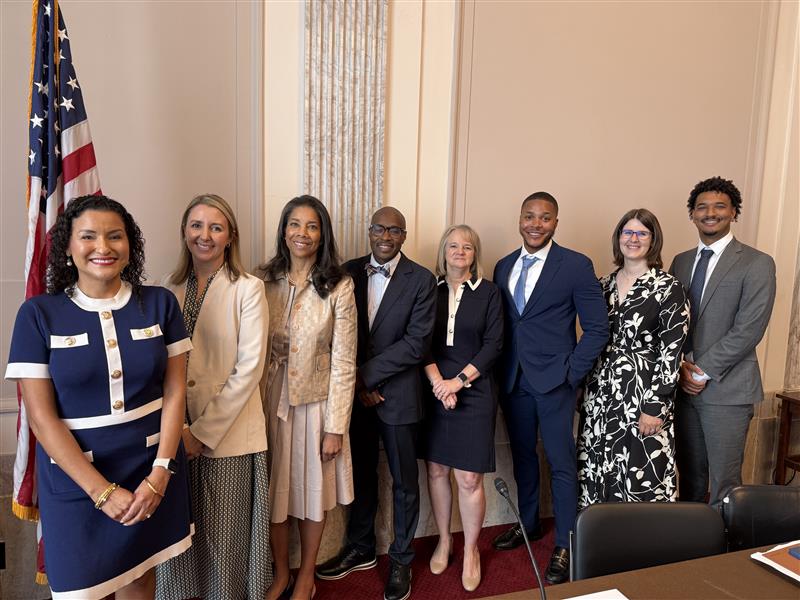ASGCT Partners with Children’s Hospital Association on Sickle Cell Disease Access
Christina Mayer - August 04, 2025
Achieving equitable access to gene therapies requires coordinated action across clinical care delivery, healthcare administration, and payment policy. By tackling the issues raised at the briefing, we can help ensure the next generation of SCD therapies reach patients, wherever they are.

The American Society of Gene + Cell Therapy (ASGCT) and the Children's Hospital Association co-hosted a bicameral briefing on July 23 called Access to a Cure: Ensuring Equitable Access to Cell and Gene Therapies for Children with Sickle Cell Disease. The briefing brought together bipartisan congressional staff, clinical experts, and patient advocates to examine the promise and challenges of delivering transformative treatments.
Sickle cell disease (SCD) affects approximately 100,000 people in the United States. While the first gene therapies for SCD, Casgevy and Lyfgenia, received FDA approval in December 2023, access remains limited to a small but growing number of clinical centers.
The briefing began with greetings from Meghan McCully, Legislative Assistant to Senator Tim Scott, and Gabriella Vesy, Legislative Assistant to Senator Raphael Warnock. ASGCT thanks both Senators and their staff for their many efforts to support SCD warriors and their families.
ASGCT member Dr. Alexis Thompson, Chief of the Division of Hematology at Children's Hospital of Philadelphia, opened the discussion by providing context on the gene therapy development pipeline and the other standard of care treatment options currently available. Building on Dr. Thompson’s comments, fellow ASGCT member Dr. Andrew Campbell, Director of the Comprehensive Sickle Cell Disease Program at Children's National Hospital, detailed eligibility requirements for SCD gene therapies and how clinical teams, SCD warriors, and their families assess their options. Cell and gene therapies (CGTs) represent a major shift in treatment, from managing symptoms to addressing the genetic root cause of disease – but not all patients are eligible or interested in pursuing gene therapy treatment.
Turning from clinical considerations to administrative realities, Dr. Caroline Preston, Director of Pharmacy Operations at Children's National Hospital, provided insight into the operational and financial challenges hospitals face when administering CGTs. That includes the need to build or upgrade facilities, train staff, and manage detailed oversight and reporting systems. ASGCT's Chief Advocacy Officer, Margarita Valdez Martínez, discussed the ways in which CGTs, with high upfront costs and potentially long-term durability from a single administration, do not fit neatly in the established pharmaceutical payment landscape. She highlighted the Centers for Medicare and Medicaid Innovation's (CMMI) Cell and Gene Therapy Access Model as a potential solution. This innovative approach allows states to participate in centrally negotiated outcomes-based agreements for SCD gene therapies, and represents a promising pathway to improve access.
Aimee Ossman, Vice President of Policy Analysis and Implementation at the Children’s Hospital Association, moderated the panel discussion. Presenters pointed to additional policy changes needed to address systemic challenges, all of which can create or exacerbate disparities in access to these life-changing treatments. Key areas for Congress to engage include:
- The need for robust research funding from the National Institutes of Health (NIH), which is crucial to keep the US biomedical ecosystem strong and promote future therapeutic discoveries.
- Renewal of the Rare Pediatric Disease Priority Review Voucher (PRV), which encourages rare disease therapeutic development without the need for any federal funding.
- Through CMS oversight, addressing inconsistent Medicaid reimbursement across states. Such disparities can make it more challenging for patients and providers to assess and then access treatment options.
- Support for comprehensive wraparound services for SCD warriors who receive a gene therapy. That includes care coordination and family support, as well as the availability of fertility preservation services.
Achieving equitable access to gene therapies requires coordinated action across clinical care delivery, healthcare administration, and payment policy. By tackling the issues raised at the briefing, we can help ensure the next generation of SCD therapies reach patients, wherever they are.
ASGCT extends its gratitude to Senator Scott and Senator Warnock for their leadership on SCD policy, to the Children's Hospital Association for their partnership, and to all presenters and attendees who contributed to this vital conversation.
Related Articles
Policy & Advocacy
Why I’m Attending the 2025 Policy Summit—and Why You Should, Too
Emily Walsh Martin, PhD - September 10, 2025
Policy & Advocacy
ASGCT to Host 2025 Policy Summit on Sept. 25-26 in Washington, D.C.
September 02, 2025
Policy & Advocacy
ASGCT Supports Further Alignment of Regulations with Scientific Advancement in CGT
Andrew Liermann and Alexis Starosta - August 15, 2025
Policy & Advocacy
FDA Cell & Gene Therapy Roundtable: Putting Every Patient Within Reach of Innovation
Terry Flotte, MD, and Paula Cannon, PhD - June 11, 2025